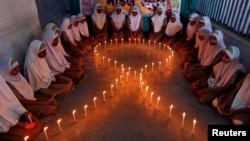Educating the world's religious leaders could encourage millions more men to undergo circumcision and reduce the rate of new HIV infections, according to research printed in the Lancet medical journal.
Circumcision can lower a man's risk of getting HIV by up to 60 percent, according to the World Health Organization (WHO), which recommends it as an effective intervention in countries gripped by an HIV epidemic.
In Tanzania alone, the education drive could lead to more than 1.4 million new circumcisions, which could in turn prevent 65,000 to 200,000 new HIV infections, the research showed.
In 2011, the WHO set a target of 20.8 million new circumcisions across 14 sub-Saharan countries by 2016. By the end of 2015, just 10 million men had been circumcised, the study said.
Previous research had suggested that a low uptake may be influenced by religious tradition and fears that circumcision could be an attempt to convert Christians to other religions.
Circumcision is widely practiced by Jews and Muslims, and is carried out by some Christians. The practice predates Islam and Judaism and was depicted in ancient Egyptian tombs and wall paintings. Aside from religious reasons, it is often carried out for health reasons or as a rite of passage in childhood or puberty.
When religious leaders are highly respected in their communities, they can use this influence to convince more men to get circumcised and therefore help to prevent new HIV infections, said the study, which was published late Tuesday.
The researchers studied 16 villages in Tanzania where the country's health ministry carried out a circumcision campaign.
In villages where religious leaders attended seminars about the procedure, 23 percent more men were circumcised compared to villages that only received information from the ministry.
More than 30 percent of men cited discussions in church as the reason for their decision to undergo the procedure.
"We equipped religious leaders with information and education, and then they could teach their congregations as they saw fit," Jennifer Downs, of Cornell University and the lead author of the report, said in a statement.
Sub-Saharan Africa has the highest rate of the virus that causes AIDS, accounting for about 70 percent of the 36.7 million people living with the virus worldwide, according to the WHO.
Nearly 1.4 million people were newly infected with HIV in the region in 2015.
The research said educating religious leaders about the role of circumcision in HIV prevention should be extended to other sub-Saharan countries. They could also be involved in promoting other healthy behaviors, it said.
The study took place from June 2014 to December 2015.













